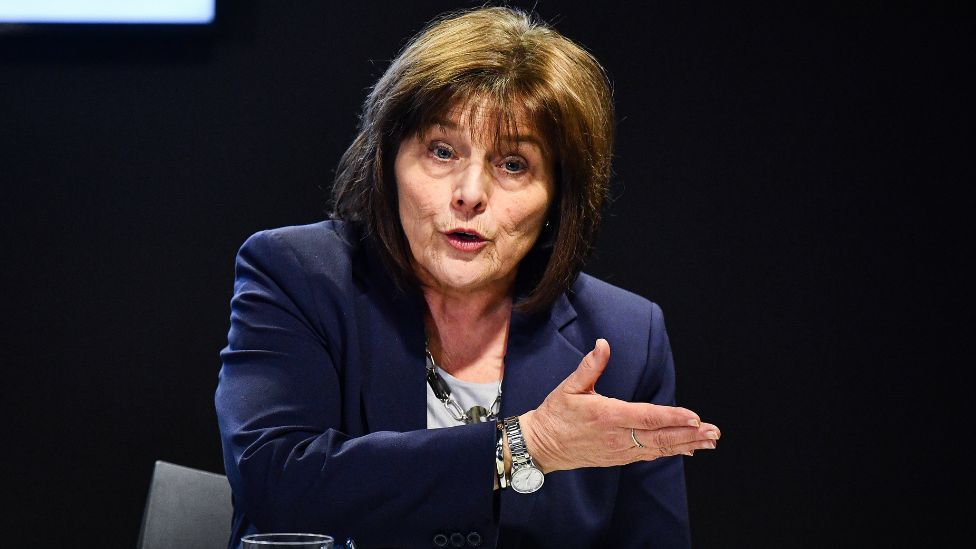
Former SNP MSP Jeane Freeman was Scottish health secretary from 2018 to 2021
Former health secretary Jeane Freeman says SNP ministers have been “caught by surprise” by the row over Scotland’s new hate crime law.
She also said misogyny should have been included in the legislation, which creates a crime of “stirring up hatred” relating to protected characteristics.
Police Scotland received thousands of complaints after its launch last week.
BBC Scotland News understands only a small number were made during Sunday’s Old Firm match at Ibrox.
The force is expected to publish full figures this week.
Ms Freeman, who was health secretary from 2018 to 2021, told BBC Scotland’s The Sunday Show her reaction to the new law was one of “frustration at the level of misinformation”.
She said: “My impression is that the furore and genuine concerns over the last week has caught the Scottish government by surprise.”
Ms Freeman said ministers should have planned for the law coming in “at this particular point in the electoral cycle”.
She said “if you leave loopholes in it and don’t set out what it does and doesn’t do” it would be used by political opponents.
Ms Freeman said she understood why some women’s groups agreed misogyny should not be included following a 2022 report by a review group chaired by Baroness Helena Kennedy KC.
But she added: “My own view is that was a loophole that you left in the legislation, left wide open to be exploited.
“So I have two sets of conflicting frustration. One about how this has been handled, prepared for and presented, and the other being how it has been mishandled and misinformed in a lot of the presentation and comment.”
Image source, PA Media
Scottish Greens co-leader Patrick Harvie condemned misinformation surrounding the act
Last week First Minister Humza Yousaf said the Hate Crime and Public Order (Scotland) Act 2021 protected the “most vulnerable and marginalised” while safeguarding freedom of expression and speech.
The act creates a new crime of “stirring up hatred” relating to age, disability, religion, sexual orientation, transgender identity or being intersex.
The maximum penalty is a prison sentence of seven years.
A person commits an offence if they communicate material, or behave in a manner, “that a reasonable person would consider to be threatening or abusive,” with the intention of stirring up hatred based on the protected characteristics.
Stirring up hatred based on race, colour, nationality or ethnicity was already illegal in Great Britain under the Public Order Act 1986 but, in an attempt to streamline the criminal law in Scotland, that too is now part of the Hate Crime Act.
On Sunday, Scottish Greens co-leader Patrick Harvie condemned the “deplorable levels of misinformation” surrounding the act.
The Glasgow MSP also revealed he was contacted by Police Scotland officers on Saturday over “vexatious complaints” that had been made in his name.
He told The Sunday Show: “I genuinely would appeal to those who are creating this misinformation and creating this wave of confusion and hostility, think about the real-world consequences of your actions.
“This is emboldening not the online keyboard warriors, not the people who get to write angry columns in newspapers, it is emboldening the worst elements of our society who genuinely do pose a threat of outright abuse and violence.”
Jack McConnell said action was needed before the summer
And, writing in the Sunday Mail newspaper, former First Minister Jack McConnell branded it “unworkable”.
Lord McConnell, who was Scottish Labour leader and first minister from 2001 to 2007, said the act “inflamed” trans misgendering rows.
He also compared it to the Offensive Behaviour at Football and Threatening Communications (Scotland) Act, which was repealed in 2018.
Lord McConnell warned Police Scotland officers would be dealing with many “simply spurious” complaints at a time when the force’s budget was under pressure.
He added: “The arguments between feminist and transgender campaigners – excluding crimes against women from the Act has inflamed the situation with many women feeling their concerns are ignored.
“This is exactly what good legislation should seek to avoid. Good political leadership should try to win the argument, build a consensus not sow division.”








